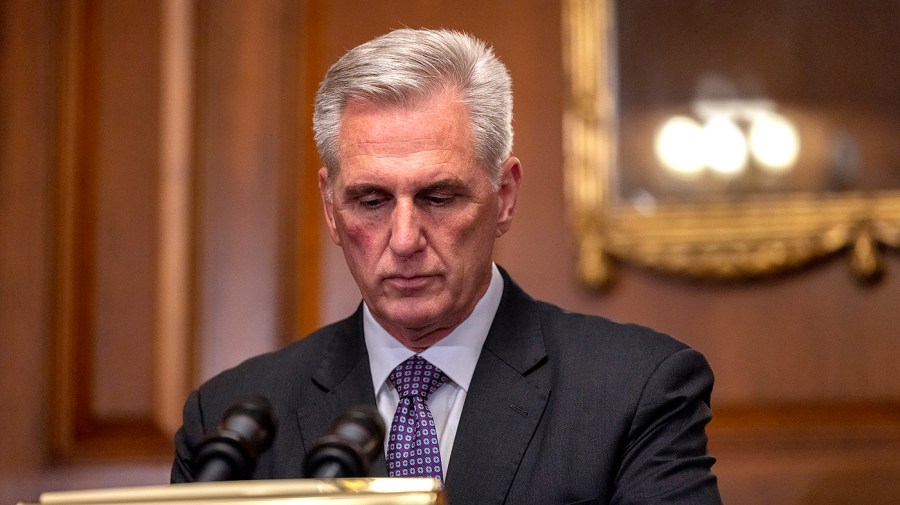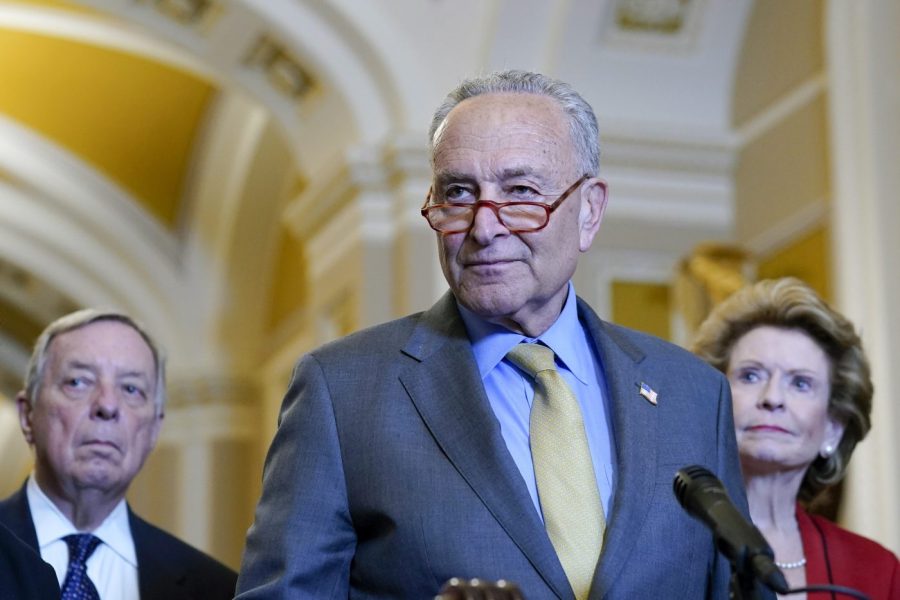Debt ceiling brinkmanship was too dangerous, analysts warn
The chaotic process by which President Biden and Congress reached a deal to avoid a default on the federal debt could have long-running costs for the U.S. economy.
Political and financial experts are fretting over the latest episode of fiscal brinkmanship, arguing that the disruption threatened by default was simply not worth the moderate reduction in the deficit.
“There has been a steady deterioration in governance over the last 15 years, with increased political polarization and partisanship as witnessed by the contested 2020 election and repeated brinkmanship over the debt limit. Failure to tackle fiscal challenges from growing mandatory spending has led to rising fiscal deficits and debt burden,” credit agency Fitch Ratings warned last week.
Glass half-empty: US credit rating to stay on Fitch’s ‘negative watch’ despite debt limit deal
Fitch maintained its negative ratings watch on the U.S. debt Friday, as it “considered the full implications of the most recent brinkmanship episode” and the outlook for U.S. debt trajectories.
The doomsday contingency of the debt ceiling fight is more evidence of polarization within U.S. politics, some experts say, and the fact that cooperation and compromise between the parties can only happen when the stakes are almost preposterously high.
“What makes this extraordinary is that there is a space where the two parties can and should have sustained debate about the spending priorities of the country, and that’s in the appropriations process,” William Howell, a politics professor at the University of Chicago Harris School of Public Policy, told The Hill.
Both sides embellished their negotiating positions, with the White House writing off negotiations altogether before agreeing to talks and Republicans failing to produce a specific set of budgetary priorities until late in the game.
Analysts are warning that the process was overly pompous and that procedural corrections need to be made in the future in the interest of financial stability.
‘Not something you see in other advanced democracies’

A U.S. debt default could have tanked the stock market, delayed Social Security checks, held up Medicare payments for hospitals and doctors, paused government contracts and salaries, and sent everyday borrowing costs skyrocketing.
Flashback: Social Security, Medicare and stocks: How a debt-ceiling crisis could affect you
But the full effect of a U.S. default isn’t really understood. Since one has never happened, it’s hard to know how international holders of U.S. debt — the biggest three of which are Japan, China and the United Kingdom — would have responded.
“The right is completely frustrated with its inability to dampen Democratic spending priorities and reduce overall spending amounts, and so what it’s done is to give up on that space and look to another one where there’s fear of economic catastrophe, to bring us right to the edge of a default,” Howell said.
“That’s not something you see in other advanced democracies.”
Debt deal does little to reduce debt

Republican lawmakers insisted that the U.S. could not afford to raise the debt ceiling without serious spending cuts, but the actual bill to raise the debt limit will affect the level of the national debt only modestly.
The spending cuts — assuming they hold — will drop spending by $1.3 trillion over the next decade and reduce the interest burden by $188 billion, according to the Congressional Budget Office.
That’s compared to the level of total U.S. debt stock, which now stands above $31.4 trillion, or about 120 percent of U.S. gross domestic product.
Rather than being a purpose-built debt killer, the bill advances a series of spending priorities favored by both Republicans and Democrats, including clearing the way for a new natural gas pipeline, advancing military contracts and adding work requirements for social programs that would actually increase the cost of administering them.
The legislation fails to enact redistributive taxes on the wealthy that most Americans want to see and takes away some of the money for the IRS designed to increase audit and enforcement rates on richer taxpayers.
IRS cutbacks: Debt ceiling deal throws a wrench into IRS overhaul
Moreover, the legislation raises the debt ceiling only until January 2025, meaning the whole process of a spending debate as forced by a debt ceiling ultimatum is due to be repeated in short order.
“Because the consequences are so dire, this high-stakes game of debt-limit chicken always ends the same way: Congress raises the borrowing cap just before calamity strikes. The theater does little more than waste money and generate a lot of breathless commentary,” Leonard Burman, an emeritus professor of public administration at Syracuse University, wrote in a 2021 analysis of debt ceiling standoffs.
Alternative roads not traveled

Democrats could have gotten around the entire process of negotiating with Republicans to lift the debt ceiling by simply raising it themselves during the lame duck session of Congress last year when they still controlled both chambers.
Instead, Senate majority leader Chuck Schumer (D-N.Y.) and linchpin Democrat Joe Manchin (D-W.Va.) said they preferred working in a bipartisan way on spending, presaging the spring debt ceiling fight that nearly shook global finance to its core.
“We’d like to get a debt ceiling done in this work period. The best way to get it done — the way it’s been done the last two or three times — is bipartisan,” Schumer (D-N.Y.) said last November.
Senate Majority Whip Dick Durbin (D-Ill.) said around the same time that there wasn’t enough time in the legislative calendar to get a debt ceiling bill passed through the reconciliation process.
That was despite some explicit attempts to get ahead of the problem, including a proposal from Sen. Bernie Sanders (I-Vt.) to preempt Republicans from using the debt ceiling “as leverage to force spending cuts next year.”
“I think Democrats have got to be very, very strong in making it clear that Republicans cannot hold hostage the entire world economy in a desire to cut Social Security, Medicare and Medicaid,” Sanders said in November.
A dangerous norm
Policymakers have been concerned for years that debt ceiling brinkmanship has calcified into a dangerous norm in U.S. politics.
Despite frequently warning of the economic catastrophe that could result from a failure to raise the borrowing limit and an initial refusal to entertain spending cuts, the Biden administration didn’t seriously pursue any workarounds that could have allowed it to stick to its guns and pull the financial system back from a precipice.
These potential options included minting additional U.S. currency to be submitted to the Federal Reserve for the purpose of lowering the debt level below the legal threshold, or invoking the 14th Amendment, which commands that the U.S. public debt can’t be questioned.
Treasury Department Secretary Janet Yellen wrote the coin proposal off as a “gimmick” and said recourse to the 14th Amendment could provoke a “Constitutional crisis,” seeming to prefer the traditional negotiating process despite her regular doomspeak on the consequences of default.
Lawmakers unlikely to change debt ceiling laws
Legislative efforts to avoid the high-stakes negotiation around the debt ceiling in the future have also by and large failed to gain traction, indicating a degree of tolerance with the status quo.
Sen. Brian Schatz (D-Hawaii) reintroduced legislation in April that would abolish the debt ceiling, calling it “an arbitrary limit set by Congress.” Biden has pushed back against such notions, labeling them “irresponsible.”
Other workarounds, such the Gephardt Rule, which entailed an automatic raising of the debt limit whenever Congress passes legislation that would make it necessary to do so, have also failed to resurface.
“When Congress passes spending or tax bills, the Congressional Budget Office and the Joint Committee on Taxation already estimate their budgetary effects. They easily could add interest payments to calculate estimated effects on the debt,” Burman wrote.
“If deficit hawks objected to the higher debt, this would be the time to make legislators go on record — when they could actually change course — not years later when the Treasury has to borrow the additional money to pay the bills Congress created,” he added.
Copyright 2023 Nexstar Media Inc. All rights reserved. This material may not be published, broadcast, rewritten, or redistributed.

